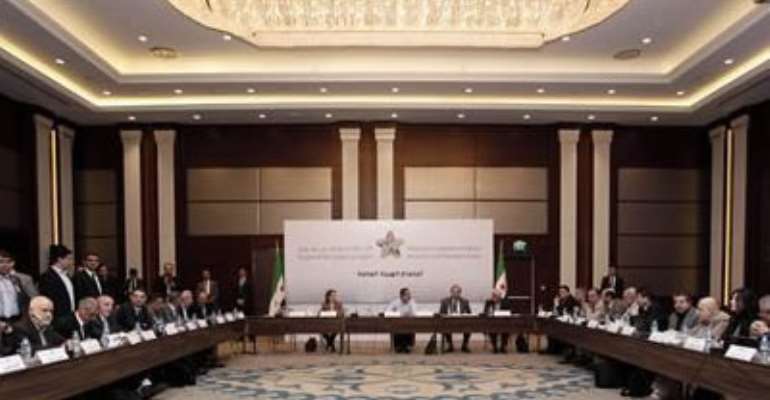UK To Urge More Help For Syrian Opposition At G8 Talks

Britain will call for more help for the Syrian opposition in its civil war against President Bashar al-Assad when G8 foreign ministers meet on Wednesday, but there are no signs of a major shift in policy.
North Korean threats of war will also be high on the agenda of the Group of Eight leading industrialized nations - the United States, Britain, France, Germany, Italy, Japan, Canada and Russia - meeting in the British capital.
The talks, which formally begin over dinner on Wednesday and end on Thursday, will also be the first chance for the ministers to discuss face-to-face the failure of last week's meeting in Almaty on curbing Iran's nuclear program.
Leaders of the Syrian National Coalition (SNC) will be present on the sidelines of the G8 and hold talks with those foreign ministers willing to meet them, British Foreign Secretary William Hague told reporters on Tuesday.
The radicalization of elements of the divided opposition has tempered the enthusiasm of some Western nations for supporting the rebels militarily. Iraq's al Qaeda wing said on Tuesday it had united with Syria's al-Nusra Front, a kindred group.
Michael Stephens, a Doha-based analyst for security think tank RUSI, said the presence of SNC leaders at the G8 meeting was designed to help the coalition shore up its international legitimacy after the Arab League recognized it as the sole representative for Syria.
"It shows there's a graduated process, where they went from laughing stock to being approved by the Arab League to being listened to by G8 leaders," he said. "There's a groundswell of support that appears to be building up behind them."
Hague, his French counterpart Laurent Fabius and U.S. Secretary of State John Kerry are to have lunch with Syrian civilian opposition figures but Russian Foreign Minister Sergei Lavrov, whose country has backed Assad, will not.
There was no sign Russia would relent in its long-standing opposition to any U.N. Security Council move that would increase pressure on Assad, though Kerry and Lavrov were to discuss Syria and other issues one-on-one.
"Look, it's no secret that Minister Lavrov ... does not have the identical perspective that we do," a senior U.S. State Department official told reporters on condition of anonymity.
The official, however, suggested some of Assad's advisers might be coming to the conclusion that the civil war, now in its third year, would ultimately be a losing proposition for him.
"I think the people around him certainly know he has a losing hand and this is not going to get solved, at the end of the day, for him militarily," the official said.
ARMS EMBARGO
France and Britain are expected once again to press the case for amending or lifting an arms embargo on Syria to support the outgunned rebels and help end a conflict that has claimed an estimated 70,000 lives and displaced millions of people.
"This is turning into the greatest humanitarian catastrophe of the 21st century so far, and we cannot watch this happen," Hague said, adding that humanitarian aid, while indispensable, would not alone solve the Syrian crisis.
"We certainly believe that it's necessary to continue, if the situation continues to deteriorate, to increase the practical help we give to the Syrian opposition," Hague said.
Paris and London say Assad could be forced to the negotiating table by allowing the supply of arms to the rebels.
Russia and Germany oppose such a move, arguing it could lead to weapons falling into the hands of Islamist militants and fuel a regional conflict.
The foreign ministers will also discuss how to respond to North Korea, which has been threatening to attack the United States and South Korea and on Tuesday warned foreigners to evacuate the South to avoid being caught in a war.
Russia said on Tuesday the G8 was in agreement in rejecting North Korea's provocative behavior and urged all sides to pursue diplomacy.
Hague said the ministers also planned to discuss Burma, Somalia, cyber-security and sexual violence in war zones.
REUTERS
